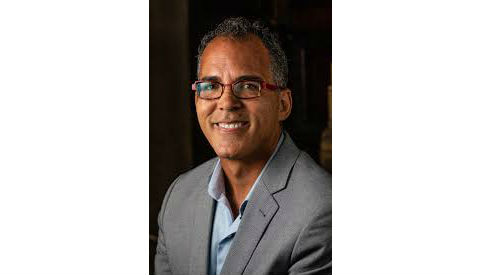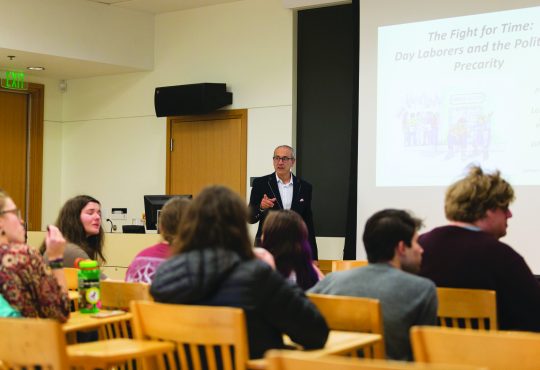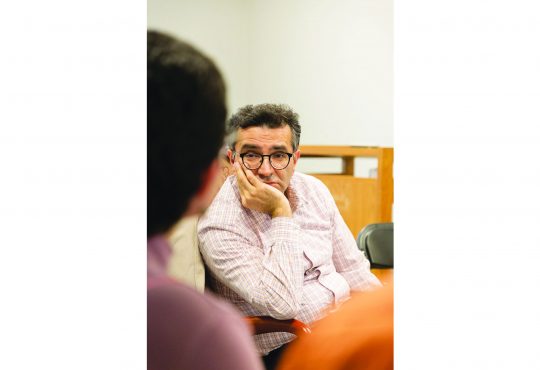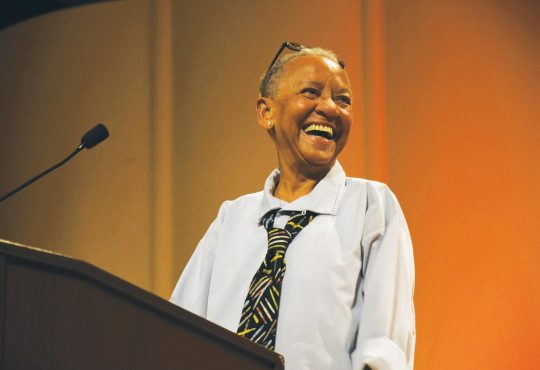By SABINE GLOCKER
At age 14, Leon Ichaso was sent to an airport in Cuba where his father told him, “Look at me well, because you will never see me again. I believe in this revolution and this is where I am staying.”
After leaving Cuba and Fidel Castro, he said he had two options: “to become a 14-year-old alcoholic” or to create healthier coping methods. This is what film became to him—a coping method and an escape.
In his talk on Oct. 10, he discussed filming a movie set in Hollywood in the 1930s. He talked about how it felt like he was “living in the world of Hollywood in the 1930s” and how in film, you “are always in different places, and that, to me, seemed pleasant.” He liked the escapist fantasy provided by filming in different locations.
“Movies allow you to be a tourist,” Ichaso said.
In 1967, Leon Ichaso went to New York City, and on his second night in the city, he was given a job in a bar on Park Avenue. On his first night on the job, he was asked to throw a drunk man out of the bar. That man turned out to be Jim Morrison of the Doors, who was in the area during the summer tour promoting “Light My Fire.” A little while after the incident, he went back to college, but it did not feel the same, and he never completed school.
Despite his lack of an advanced education, Ichaso has had a wildly successful career.
In 2006, he worked with Jennifer Lopez and Marc Anthony in the film El Cantante. He directed episodes of Saturday Night Live, Miami Vice, Medium and Persons Unknown.
Filmmaking was not his first career choice. When Jake Gyllenhaal’s father, Stephen Gyllenhaal, asked him why he was making films in an independent filmmakers’ group, he said he had wanted “to be a motorcycle racer, or a wrestler,” but after failing to do either of those, he discovered and “surrendered” to movies. He said he planned on only “develop[ing] a mild interest,” but that he “underestimated what [he] was getting into.”
He “never questioned it until Jake Gyllenhaal’s father challenged” him. Despite wondering why he “suffered so much making movies” and felt “embarrassed to call [him]self a filmmaker” because he “didn’t feel [he] earned it,” Ichaso never wondered why he made his “tremendously layered films.”
He simply loved the escape and the way that the film industry gave him a family to replace the one he had lost after leaving Cuba so young.
Ichaso described himself as someone who doesn’t “think of things in terms of money,” so he made “a lot of films that were not money makers.”
Paraiso, his 2009 film based on a true story about Cuban immigrants, is a perfect example of a film that did not make money but was filmed with such skill that people loved it.
The $30,000-budget film was not supposed to go beyond the initial planning stages. He planned on going to his niece’s wedding in Miami, but instead ended up making a movie. The wedding is even featured in the film, except as a funeral. He called the scene “so beautiful.”
Ichaso predicts that his next career move will be in television. He said that there is not enough work for movie directors in the film industry, so a lot of people are out of work.
“I find myself at a new horizon with my career, which is television,” he said. “I’m facing either the end of my career or the beginning of a new one.”
After his talk concluded, I had the chance to talk to him personally. In the spirit of the approaching Halloween, I thought it would be appropriate to ask him about his views on horror movies. His first response was “did you see the film [Paraiso] that showed last night?” He spoke about how the violence and the murders in the film were his attempts at the horror genre.
When asked how he would film a big Blockbuster-type horror movie, he said that his would be “blood and guts galore.” He added that horror movies are “the easiest to make” and are “big money makers.” “I love them,” Ichaso said.
Leon Ichaso is a director with many talents. He has done blockbuster films, independent films, films in Spanish and in English, films that made money and films that did not and television. An extremely friendly man, he embraces life with joy and hope despite his struggles.
“Wow, that guy sounds fascinating,” he said of himself, laughing, after his introduction to the talk’s audience.






